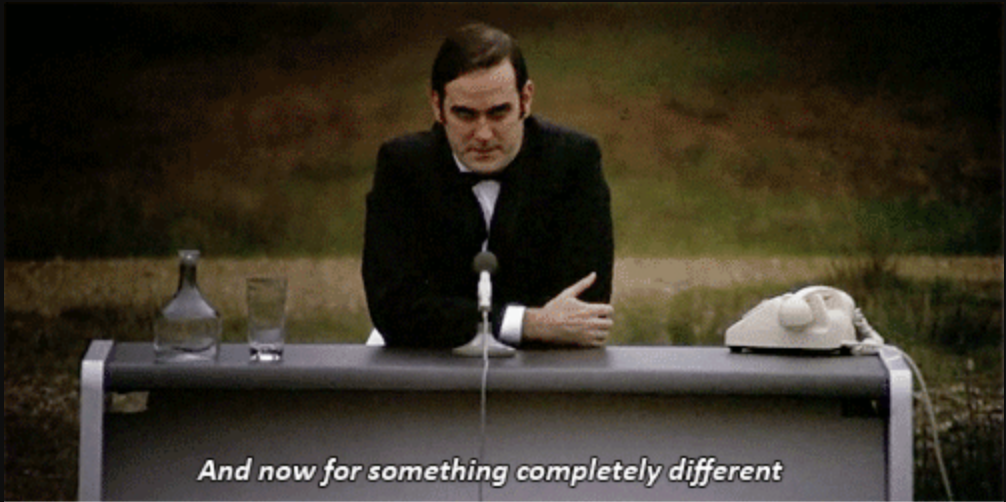Monty Python's Life of Brian: On-This-Day Thursday
Every Thursday, an older film released on this opening weekend years ago will be reviewed. They can be classics, or simply popular films that happened to be released to the world on the same date.
For August 17th we are going to have a look at a film that is far too late to be considered for this week, but, sure, what the hell. It doesn’t matter, because I’d much rather be watching a new movie instead. Pah. Who even goes to movies anymore? I mean, seriously? I mean I do, but I am far from the general populace. Like, who has time? My sister had to take her wolverine to the vet the other day, because it was refusing to take its pills to cure it of its dysentery. That’s a far more urgent matter. Punctuation barely matters. See now was that a question or a statement what about this things are confusing without capitalization or punctuation i prefer this gig i honesty dont ever want to go back i w-
We fired our content writer and have gone forth with a new writer. We apologize for this episode, and we will continue as if nothing happened.
One of the greatest stories in absurdist film history is when Eric Idle discussed the latest Monty Python film in the works to his good friend George Harrison. It was to be a religious satire where a commoner is turned into a messiah by mistake. Harrison asked how the film was coming along. Idle said it wasn't. The script was still being worked on, but no studio would fund this extremely taboo project. Harrison handed over a cool heap of cash, simply because he "wanted to see the movie". With that came the most expensive film ticket ever paid (in the millions), and a savagely hilarious film that remains controversial to this day.
Life of Brian transcends anything the Python crew ever did, because of the ability to turn a series of skits into an actual functioning tale. The Holy Grail is still one of the funniest films ever made, but it is a lot more comfortable being a slew of moments (there is nothing wrong with that, because it is pulled off well). Life of Brian dared to do more. In order to have the difficult discussions it was going to have, it had to go the extra mile. You can't just half ass offending every religion. A home run has to be hit.
This is one hell of a way to do so.
Despite this fully functional story, we still have the Python gang rotating as a series of unrelated characters. Let's be real. You are always aware of who is playing who. There is no illusion here. The whole premise is entertaining because of the continued absurdity Python always feeds off of. Having male performers dressed up as women pretending to be men to take part in a stoning session is what I mean. This time, the company did have money (some of it from an ex-Beatle, no less). They still had seven people playing the majority of the characters. It never gets stale.
As taboo as the film may be, you can see where the efforts lied. The Monty Python six didn't intend on squarely offending members of any religious group. They wanted to create humour. They won't hold back on the comedy that they make, so they execute their material no matter who gets bombarded in the way. It's also no secret that members of the group are outwardly non religious, so that likely doesn't help anyone defending the film as a non-accusatory piece of comedy. It's true though. Do extremists get attacked? Yes, but stuff them. They deserve it, no matter what they're extreme about. Everyone here is fair game, and that's part of the fun.
These beards are the most useless props, perhaps ever. And I love them for that.
Even fourty years ago, a film like this contains riffs about political topics that are very current. A member of a extreme group identifies as female, and wishes to bear children. What helps this skit age way better than other similar jokes in film history is how the weight of the joke doesn't lie on a person's choice to identify as a gender, or the desire to conceive. It's the reaction of the other extremists that is the source of the joke here. Idle's character is confident in her decision, and couldn't care less about what the other members say. John Cleese's character is extremely offended and tries every way to correct someone else's choices. Need I remind you this is a group of religious and political rebels that all agree on their mission to dismantle other powers, where one has an individualist thought and the other tries to use his usual methods of debate on one of his own. That's the joke. The idiocy of extremism, and the blind bumping into the walls of bigotry.
You can apply this amount of thought into any of the jokes in this film, and that proves its staying power. It's also a much easier film to defend when it comes to some of the works labeled "blasphemous" simply because jokes containing religion are used. For me, the Pythons aren't saying anyone is stupid for having their own beliefs here. They're saying "believe what you want, but some of these older methods are problematic, don't believe anything because someone else told you to, and let it be about how it cleanses you, not how you fit into society because of it". Of course, these messages aren't that straight forward. We get shown these principles through lopsided arguments against the worth of Romans, a very naughty boy accidentally gracing his following with his royal phallus, and people trying to be optimistic about being mass crucified.
The last part, of which, is a fate much greater than dealing with this mother your entire life.
Will this film still offend people regardless of their open mindedness? Absolutely. There are a number of moments that poke the bear enough times to cause a ruckus. That's part of the fun, though. It's been forty years, and Life of Brian can still cause an uncomfortable moment in any living room. I don't advocate that jokes should always be dangerous, but in a confined space like this film, they can certainly be a major catalyst. What makes you laugh more than knowing when to laugh? Knowing you shouldn't. Imagine watching Life of Brian with a group where there will for sure be some different responses. Is it okay to laugh at things others hold dear to them? What if they're our own beliefs?
The Monty Python way is to say "Who gives a flying circus?" (a pun used as a hopefully clever form of censorship by me). I had the same ideology posting an On-This-Day review of a film that technically came out last week (forty years ago). Life is too short, and it is far too stupid to not embrace what makes it stupid. Brian's life, as we see it, is nothing but misery, unfortunate circumstances (including the greatest of unrelated scenes, directed by Terry Gilliam) and speed. As soon as he's born, he's an adult. As soon as he's an adult, he's dead. He is not the messiah, so any chance of rebirth is likely somewhat slim.
Two of the only people in the film to realize this.
Like any other Monty Python classic (film or sketch), the crew is divided into their usual roles. John Cleese is the lead comic that takes on the brunt of many scenes. Michael Palin is the chameleon that plays a great foil to Cleese or any scenario. Graham Chapman is the best anchor, rendering him the star of the film and all its madness. Eric Idle is the song and dance man, whose greatest moment is saved for the grand finale. Terry Gilliam doesn't really animate much in this film (outside of the credits), and his directed scene represents his stepped-back, yet necessary, role. Carol Cleveland is the honorary Python member, who provides an extra element to each joke she is a part of.
Moving right along, no laughter here.
The final member is Terry Jones, who directed the majority of this film by himself. He allowed the work of every member to gestate, and cause each scene to tell its tale. As for him, he went above and beyond with his visions on Life of Brian, and it shows. Most of the sets and props (aside from the occasional fake donkey) are far too great to be in a film this silly, but that in and of itself is part of the joke. Life of Brian cannot be denied out of outrage, because it's nearly to impossible to correctly insist that it wasn't a well made film. So much work was placed into something that's actually kind of pointless outside of its chain of laughter. “Life’s a piece of shit, when you look at it,” says a beaming Eric Idle during his great “Always Look on the Bright Side of Life” number. He said that in a film that George Harrison paid good money (really good money) to see. It remains one of the iconic songs in film history, played at both weddings and funerals to this day. We can take Life of Brian seriously as a film, because the work was put into it. If you take it too seriously as a joke, then you’re really trying much too hard. That’s the final joke, and why Life of Brian remains debatably the greatest offbeat comedy of all time.
Andreas Babiolakis has a Masters degree in Film and Photography Preservation and Collections management from Ryerson University, as well as a Bachelors degree in Cinema Studies from York University. His favourite times of year are the Criterion Collection flash sales and the annual Toronto International Film Festival.












